Originally posted on December 20, 2023 @ 8:12 am
A grocery store clerk plays an essential role in ensuring the smooth operation of a grocery store. Their primary responsibilities include assisting customers, maintaining a clean and organized store, and stocking shelves with products. They serve as the first point of contact for shoppers, providing information about products and assisting with purchasing decisions. Additionally, grocery store clerks process customer orders and payments, order out-of-stock products, and ensure that the store is clean and safe for shoppers. Proven work experience as a grocery clerk or in a similar role, along with good communication and customer service skills, are usually required for this position.
Table of Contents
Key Takeaways:
- A grocery store clerk is responsible for assisting customers, maintaining store cleanliness, stocking shelves, and processing orders and payments.
- Good communication and customer service skills are essential for this role.
- Proven work experience in a similar role is usually required.
- Grocery store clerks play a crucial role in ensuring a positive shopping experience for customers.
- They contribute to the smooth functioning and success of the grocery store.
Assisting Customers with Purchasing Decisions
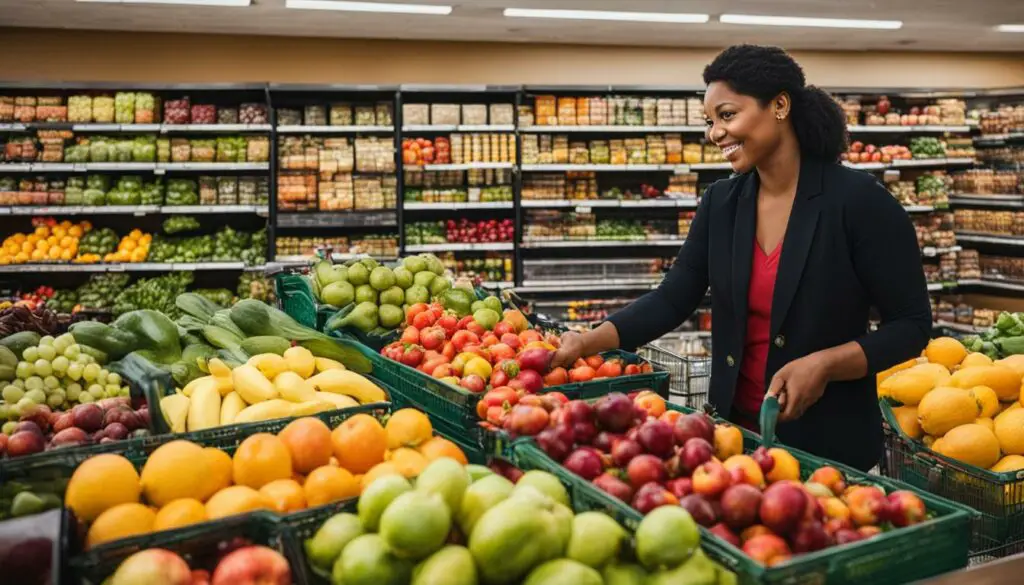
One of the key responsibilities of a grocery store clerk is to assist customers in making purchasing decisions. They play a crucial role in providing excellent customer service and creating a positive shopping experience. Grocery clerks have extensive knowledge of the products offered in the store, allowing them to offer valuable information and guidance to customers.
When customers have questions or need assistance, grocery clerks are readily available to help. They provide detailed information about products, including their features, benefits, and recommended uses. By addressing customer inquiries, grocery clerks help shoppers make informed decisions tailored to their individual needs and preferences.
Additionally, grocery clerks guide customers to the appropriate aisle or shelf to locate specific products. They are familiar with the store layout and can efficiently direct customers to the items they are looking for. This level of assistance saves customers time and enhances their overall shopping experience.
Building Rapport and Offering Recommendations
Another aspect of assisting customers with purchasing decisions involves building rapport and offering personalized recommendations. Grocery clerks engage with customers in a friendly and approachable manner, establishing a comfortable environment for shoppers to seek assistance.
Customer service is at the heart of a grocery clerk’s role. By offering exceptional assistance, clerks not only help customers make purchasing decisions but also contribute to their overall satisfaction.
Grocery clerks are skilled at understanding customer preferences and providing tailored recommendations. They take the time to listen to customers, understand their needs, and suggest suitable alternatives or complementary products. By offering recommendations based on their product knowledge and understanding of customer preferences, grocery clerks play a crucial role in influencing purchasing decisions.
Enhancing the Shopping Experience
Assisting customers with purchasing decisions is an integral part of a grocery store clerk’s role. By providing reliable information, guiding customers to desired products, and offering personalized recommendations, grocery clerks contribute to enhancing the overall shopping experience.
Grocery clerks understand the importance of creating a positive environment that fosters customer satisfaction and loyalty. Their dedication to customer service goes beyond addressing inquiries and providing guidance; it extends to building meaningful connections with shoppers.
With their knowledge, expertise, and friendly demeanor, grocery clerks make a lasting impression on customers. This personalized approach not only helps customers make confident purchasing decisions but also encourages them to return to the store in the future.
| Ways Grocery Clerks Assist Customers with Purchasing Decisions | Benefits |
|---|---|
| Providing detailed information about products | – Customer makes an informed decision – Greater satisfaction with the purchase |
| Guiding customers to the appropriate aisle or shelf | – Saves customers time – Enhances the shopping experience |
| Building rapport and offering personalized recommendations | – Creates a positive interaction with customers – Influences purchasing decisions |
Maintaining a Clean and Safe Store
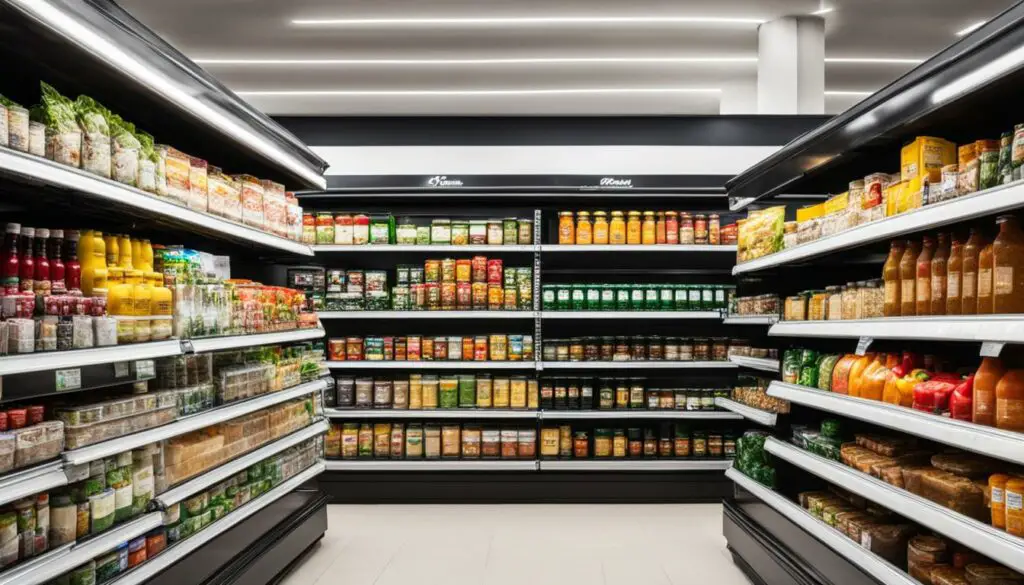
As a grocery store clerk, one of your important responsibilities is to ensure that the store maintains a high standard of cleanliness and safety. This not only creates a pleasant shopping environment for customers but also contributes to the overall success of the store. Let’s take a closer look at the tasks involved in maintaining a clean and safe store.
Cleaning and Sanitizing
A clean and well-organized store is essential for providing a positive shopping experience. As a clerk, you will be responsible for various cleaning tasks, such as sweeping and mopping floors, wiping down surfaces, and sanitizing high-touch areas. Regular cleaning is crucial to keep the store free from dirt, dust, and germs, ensuring the safety and well-being of both customers and employees.
Organizing Product Displays
In addition to cleaning, organizing product displays is another important aspect of maintaining a clean store. Properly arranging products, ensuring accurate pricing information, and utilizing effective signage help create an inviting and visually appealing shopping environment. By arranging products in an organized and attractive manner, you can enhance the overall shopping experience and make it easier for customers to find what they need.
Monitoring Safety Hazards
Ensuring the safety of customers and staff is paramount. As a grocery store clerk, it is your responsibility to identify and address safety hazards promptly. This includes monitoring for spills, leaks, or damaged equipment and taking immediate action to clean or fix them. By being vigilant and proactive in addressing safety hazards, you contribute to creating a safe environment for everyone.
Responding to Emergencies
In the event of an emergency, such as a fire or medical incident, quick and appropriate action is crucial. As a grocery store clerk, you may be called upon to respond to such situations and assist customers or facilitate emergency protocols. Having a basic understanding of emergency procedures and knowing how to remain calm and composed can help ensure the safety and well-being of everyone involved.
Image:
| Benefits of Store Cleanliness and Safety |
|---|
| Enhanced customer experience |
| Reduced risk of accidents and injuries |
| Improved employee morale |
| Positive brand reputation |
| Increase in customer loyalty |
Stocking Shelves and Maintaining Inventory
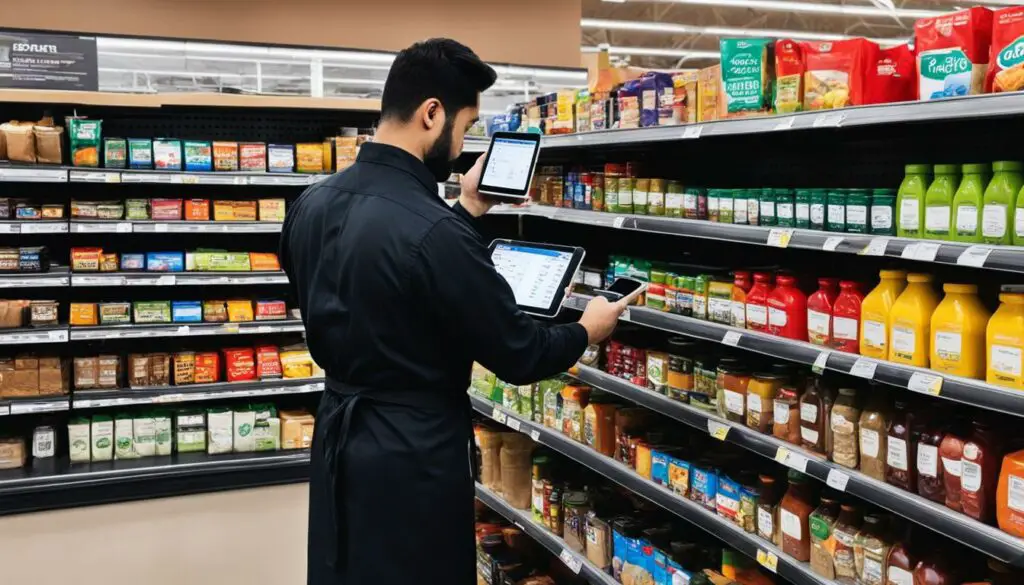
A crucial aspect of a grocery store clerk’s role involves stocking shelves and effectively managing inventory. By ensuring products are readily available and properly organized, clerks contribute to a seamless shopping experience for customers.
When new shipments arrive, grocery clerks receive and unpack the products. They carefully follow store guidelines and arrange items on the shelves, making it easy for customers to find what they need. By keeping products accurately labeled, clerks help customers locate their desired items quickly. This attention to detail enhances the overall customer experience.
In addition to stocking shelves, grocery clerks actively monitor inventory levels. Regular checks for expired items are conducted to uphold quality standards and remove any products that may be unfit for consumption. By staying proactive, clerks ensure the store’s shelves are filled with fresh and appealing products.
Grocery clerks also play a pivotal role in inventory management. They keep track of stock levels and communicate with their supervisor when products need to be reordered. By staying on top of inventory, clerks help prevent items from going out of stock and minimize any potential disruptions in customer shopping.
Efficient Stocking Process
- Receive and unpack shipments
- Follow store guidelines for shelf organization
- Accurately label products for easy identification
- Regularly check for expired items and remove them
Inventory Management
- Monitor inventory levels
- Communicate with supervisor for reordering
- Prevent out-of-stock situations
By efficiently stocking shelves and maintaining proper inventory, grocery clerks ensure that customers have access to a wide variety of products, contributing to a positive and satisfying shopping experience.
Processing Customer Orders and Payments
Processing customer orders and payments is a crucial aspect of a grocery store clerk’s responsibilities. As customers navigate the aisles and make their selections, grocery clerks play a vital role in ensuring a smooth and seamless checkout process. This section will discuss the various tasks and skills involved in efficiently handling customer orders and payments.
When a customer arrives at the checkout counter, grocery clerks are responsible for scanning and ringing up their items. They diligently input each product into the system, ensuring accurate pricing and inventory management. Additionally, clerks apply any relevant discounts or promotions to reduce the total cost for the customer.
Whether it’s cash or card transactions, grocery clerks handle payments with precision and care. If a customer opts to pay with cash, clerks calculate the total amount due and provide the accurate change. Alternatively, when customers prefer to use cards, clerks process the payment securely, taking the necessary precautions to protect customer information.
Attention to detail and good math skills are crucial for grocery clerks as they process customer orders and handle payments. The ability to accurately record purchases and provide customers with the correct change is fundamental to delivering exceptional service.
In addition to processing orders and payments, grocery clerks often extend their assistance beyond the checkout counter. They may offer to help bag groceries, ensuring items are carefully packed to prevent damage. Furthermore, clerks may offer a helping hand to customers who require assistance in carrying their purchases to their vehicles.
Providing this extra level of service goes a long way in creating a positive and memorable shopping experience for customers.
Grocery Clerk’s Order Processing and Payment Handling
| Responsibility | Description |
|---|---|
| Scanning and Ringing Up Items | Grocery clerks input products into the system, ensuring accurate pricing and inventory management. |
| Applying Discounts and Promotions | Clerks apply relevant discounts and promotions to reduce the total cost for customers. |
| Handling Cash and Card Transactions | Grocery clerks securely process payments, whether through cash or card transactions. |
| Providing Correct Change | Clerks ensure that customers receive the correct change when paying with cash. |
| Bagging Groceries | Grocery clerks may help bag groceries to ensure items are carefully packed. |
| Assisting with Carrying Purchases | Clerks may offer assistance to customers in carrying their purchases to their vehicles. |
Table: Overview of the various responsibilities related to order processing and payment handling for grocery clerks.
By efficiently processing customer orders and handling payments, grocery clerks contribute to a positive and hassle-free shopping experience. Their attention to detail, math skills, and customer-centric approach ensure that each transaction is handled accurately and professionally.
Delivering Excellent Customer Service
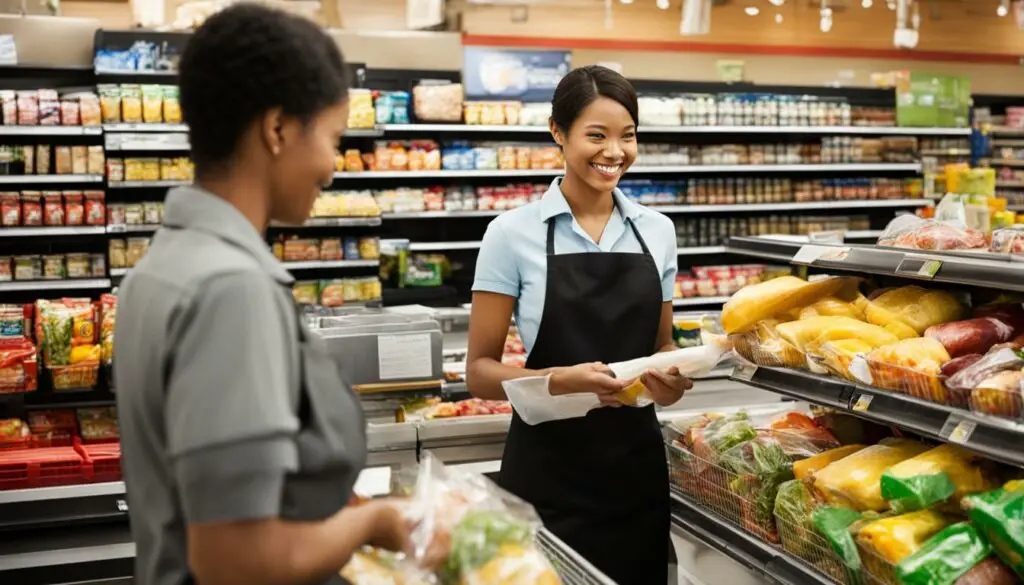
Providing excellent customer service is a fundamental part of a grocery store clerk’s role. They interact with customers on a daily basis, assisting them with their shopping needs, answering questions, and addressing any concerns or complaints. Clerks strive to create a positive and welcoming atmosphere in the store, ensuring that customers feel valued and satisfied with their shopping experience. Good communication skills, empathy, and a friendly demeanor are essential for delivering exceptional customer service.
| Key Customer Service Tasks | Role in Providing Assistance |
|---|---|
| Assisting customers with their shopping needs | Guiding customers to the desired products and offering personalized recommendations |
| Answering questions | Providing accurate information about products, pricing, and promotions |
| Addressing concerns or complaints | Listening actively, empathizing with customers, and finding appropriate solutions |
By going above and beyond to deliver excellent customer service, grocery store clerks contribute to customer satisfaction and loyalty. They understand the importance of customer retention and strive to build positive relationships with shoppers. A satisfied customer is more likely to return to the store and recommend it to others, contributing to the overall success and reputation of the grocery store.
When providing assistance to customers, grocery store clerks use effective communication skills to understand their needs and provide appropriate solutions. They actively listen to customers, allowing them to express their concerns or preferences. By demonstrating empathy, clerks show customers that their satisfaction is a top priority.
Delivering excellent customer service goes beyond just meeting the basic needs of shoppers. It involves creating a positive experience and exceeding customer expectations. By providing personalized assistance, addressing concerns promptly, and maintaining a friendly and helpful attitude, grocery store clerks ensure that customers feel valued and appreciated.
Customer service is not limited to face-to-face interactions. In today’s digital age, clerks may also assist customers through online channels, such as email, chat, or social media. They handle customer inquiries, process online orders, and resolve any issues that may arise. Flexibility and adaptability are key qualities needed to provide exceptional service through various communication channels.
In summary, delivering excellent customer service is an integral part of a grocery store clerk’s role. By providing assistance, addressing concerns, and creating a positive shopping experience, clerks contribute to customer satisfaction and the overall success of the store. Through effective communication, empathy, and a friendly demeanor, they build lasting relationships with shoppers, fostering loyalty and positively impacting the store’s reputation.
Order Out-of-Stock Products
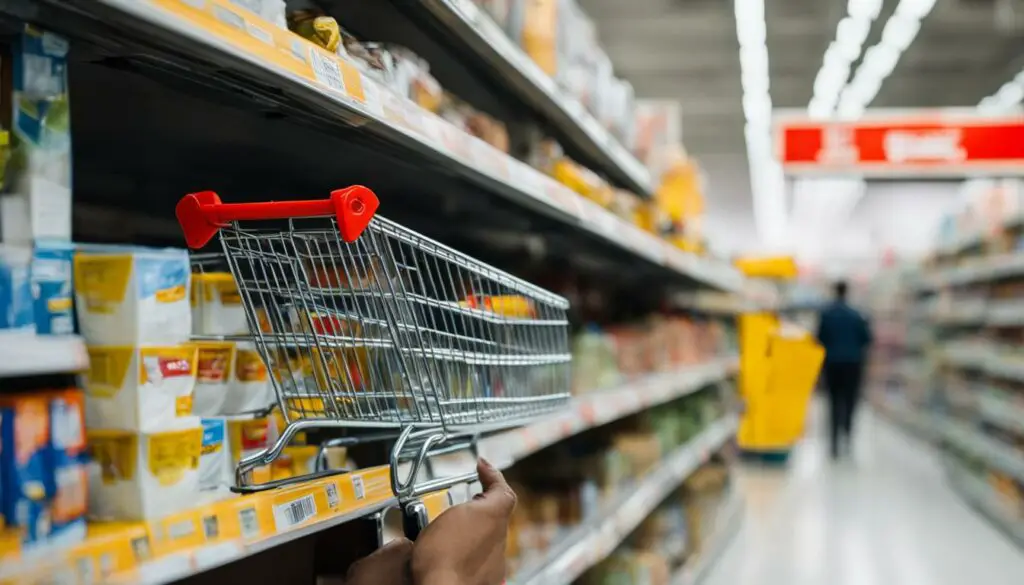
When a product is out of stock, it becomes the responsibility of the grocery store clerk to ensure its availability. Clerks keep a close eye on inventory levels and promptly identify items that are running low or out of stock. By proactively monitoring the stock, they can take the necessary steps to restock and meet customer demand in a timely manner.
In order to replenish out-of-stock items, grocery store clerks coordinate with suppliers or utilize the store’s inventory management system to place orders. This involves communicating product requirements, delivery timelines, and any special instructions. By effectively managing the replenishment process, clerks contribute to maintaining product availability and satisfying customer needs.
Ensuring product availability is crucial for customer satisfaction and the overall success of the store. Customers rely on grocery store clerks to provide them with the groceries they need, and a well-stocked store reflects positively on the store’s reputation and customer loyalty.
Organizing Food Displays
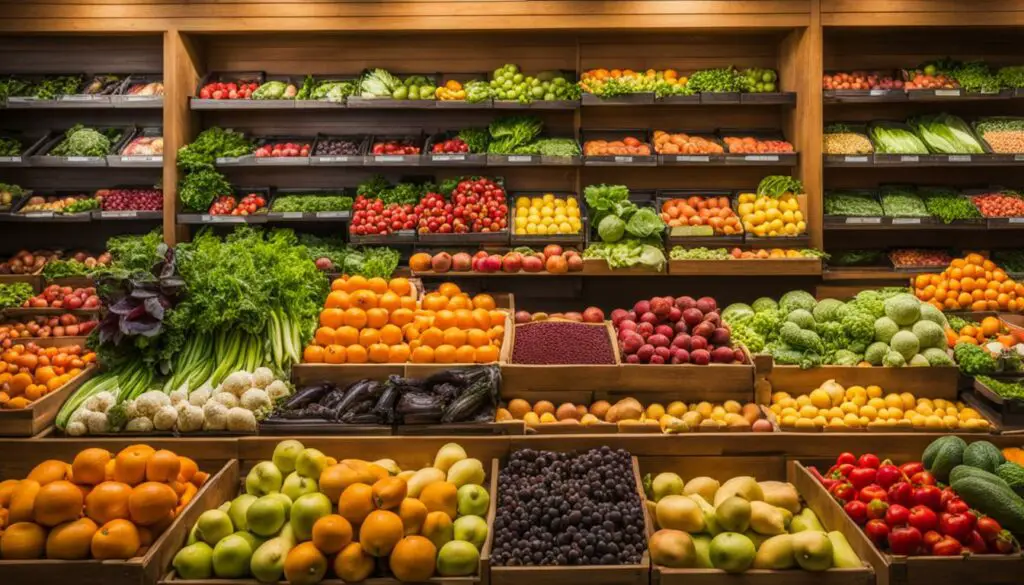
Grocery clerks play a crucial role in ensuring that the products in a store are displayed in an appealing and enticing manner. When it comes to organizing food displays, their attention to detail and creative flair can make a significant impact on customers’ shopping experience.
One of the primary tasks of a grocery clerk is to ensure that products are neatly arranged on shelves. By arranging items in an organized and visually pleasing manner, they make it easier for customers to find what they’re looking for. This attention to detail also helps create a positive first impression of the store, enticing customers to explore and make purchases.
Signage and pricing information are essential elements of an effective food display. Grocery clerks ensure that proper signage is displayed for each product, providing clear and accurate information about the item, such as its name, price, and any special promotions or discounts. This helps customers make informed decisions and increases the likelihood of a successful purchase.
Moreover, grocery clerks have the opportunity to use their creativity when organizing food displays. They can create eye-catching displays to showcase new or promotional items. By strategically arranging products and incorporating visually appealing elements such as color and texture, clerks can catch the attention of shoppers and entice them to try something new.
Benefits of Effective Food Displays
An attractive and well-organized food display can have several benefits for both the store and the customer:
- Catches the attention of customers: A visually appealing display draws shoppers’ attention and encourages them to explore the products, potentially leading to additional purchases.
- Boosts sales: A well-organized display increases the likelihood of customers making impulse purchases or trying new products, contributing to increased sales for the store.
- Enhances customer experience: Easy-to-navigate displays and clear pricing information make the shopping experience more enjoyable for customers.
- Reflects the store’s image: A clean and well-organized food display reflects positively on the store, creating a sense of professionalism and attention to detail.
In conclusion, grocery clerks play a pivotal role in organizing food displays in a way that appeals to customers and enhances their shopping experience. Through careful arrangement, attention to detail, and creative displays, they contribute to the visual appeal of the store and may influence customers’ purchasing decisions. By showcasing products effectively, grocery clerks help create a welcoming and enticing shopping environment.
Skills and Qualifications
To succeed as a grocery store clerk, certain skills and qualifications are typically required. Proven work experience as a grocery clerk or in a similar role is preferred, demonstrating an understanding of the tasks and responsibilities involved. Good attention to detail, strong communication and interpersonal skills, and the ability to work well with a team are important qualities for this position. While a high school diploma or equivalent is typically preferred, it may not always be required.
Key Requirements:
- Proven work experience as a grocery store clerk or in a similar role.
- Strong attention to detail and accuracy in performing tasks.
- Excellent communication and interpersonal skills.
- Ability to work well in a team and collaborate with colleagues.
- Basic math skills for processing customer orders and handling payments.
- Physical stamina to stand for long periods and perform repetitive tasks.
Qualifications:
While a high school diploma or equivalent is typically preferred for grocery clerk positions, it may not always be a strict requirement. Employers may prioritize relevant work experience and the ability to perform the job duties effectively. However, having a high school diploma can demonstrate a basic level of education and foundational skills that are useful in a retail environment.
Skills:
Successful grocery clerks possess a combination of technical and interpersonal skills that contribute to their effectiveness in the role. The following skills are valuable for grocery store clerk positions:
- Product knowledge: Familiarity with various grocery products, their locations in the store, and their features.
- Customer service: Ability to assist and interact with customers in a friendly and helpful manner.
- Organizational skills: Capacity to maintain an organized and well-stocked store environment.
- Time management: Skill in prioritizing tasks and managing time effectively to meet customer needs.
- Problem-solving: Aptitude for quickly identifying and addressing customer queries or concerns.
- Teamwork: Willingness to work collaboratively with colleagues to achieve common goals.
In summary, a grocery store clerk requires a combination of practical experience, essential qualifications, and valuable skills to perform their duties effectively. While work experience and strong interpersonal skills are highly desirable, educational qualifications can vary. Successful grocery clerks possess product knowledge, excellent customer service skills, and organizational abilities to ensure a positive shopping experience for customers.
Conclusion
In conclusion, the role of a grocery store clerk is crucial for the smooth operation and success of a grocery store. These dedicated individuals perform a wide range of duties, from assisting customers with their purchasing decisions to maintaining a clean and safe environment. They play a vital role in creating a positive shopping experience for customers.
One of the key responsibilities of grocery store clerks is stocking shelves with products and ensuring proper inventory management. By organizing food displays and restocking shelves, they contribute to the visual appeal of the store and ensure product availability for customers.
Moreover, grocery store clerks are responsible for processing customer orders and payments, providing excellent customer service, and addressing any inquiries or concerns. Their friendly demeanor and good communication skills create a welcoming atmosphere and help build customer loyalty.
By possessing the necessary skills and qualifications, grocery store clerks fulfill their duties effectively, ensuring the store operates smoothly. Their contribution is indispensable in maintaining a thriving grocery store that meets the needs and expectations of its valued customers.
FAQ
What does a grocery store clerk do?
A grocery store clerk plays an essential role in ensuring the smooth operation of a grocery store. Their primary responsibilities include assisting customers, maintaining a clean and organized store, and stocking shelves with products.
What are the duties of a grocery store clerk?
The duties of a grocery store clerk include assisting customers with purchasing decisions, maintaining store cleanliness and safety, stocking shelves and managing inventory, processing customer orders and payments, delivering excellent customer service, ordering out-of-stock products, and organizing food displays.
What are the responsibilities of a grocery store clerk?
The responsibilities of a grocery store clerk include assisting customers, maintaining store cleanliness and safety, stocking shelves and managing inventory, processing customer orders and payments, delivering excellent customer service, ordering out-of-stock products, and organizing food displays.
What is the job description of a grocery store clerk?
The job description of a grocery store clerk includes assisting customers with purchasing decisions, maintaining store cleanliness and safety, stocking shelves and managing inventory, processing customer orders and payments, delivering excellent customer service, ordering out-of-stock products, and organizing food displays.
What are the tasks of a grocery store clerk?
The tasks of a grocery store clerk include assisting customers, maintaining store cleanliness and safety, stocking shelves and managing inventory, processing customer orders and payments, delivering excellent customer service, ordering out-of-stock products, and organizing food displays.
How does a grocery store clerk assist customers?
A grocery store clerk assists customers by providing information about products, guiding them to the appropriate aisle or shelf, and answering any questions they may have. They have good knowledge of the products offered in the store and can offer recommendations based on customer preferences.
What is the importance of maintaining a clean and safe store for a grocery store clerk?
Maintaining a clean and safe store is important for a grocery store clerk as it contributes to a positive shopping experience for customers. They are responsible for cleaning the supermarket, sanitizing surfaces, and organizing product displays. They also monitor for safety hazards and take measures to address them.
What does stocking shelves and maintaining inventory involve for a grocery store clerk?
Stocking shelves and maintaining inventory involves receiving shipments, unpacking and organizing products, placing them on shelves, ensuring accurate labeling, checking for expired items, and keeping track of inventory levels. Clerks also inform their supervisor when products need to be ordered.
How does a grocery store clerk process customer orders and payments?
A grocery store clerk processes customer orders and payments by scanning and ringing up items, applying discounts or promotions, handling cash or card transactions, ensuring accurate recording of purchases, providing correct change, and assisting with bagging groceries and carrying them to vehicles if needed.
Why is delivering excellent customer service important for a grocery store clerk?
Delivering excellent customer service is important for a grocery store clerk as they interact with customers on a daily basis, assisting them with their shopping needs, answering questions, and addressing concerns or complaints. They strive to create a positive and welcoming atmosphere, ensuring that customers feel valued and satisfied.
How does a grocery store clerk order out-of-stock products?
A grocery store clerk keeps track of inventory levels, identifies when items are running low, and ensures that necessary products are restocked in a timely manner. This involves coordinating with suppliers or placing orders through the store’s inventory management system.
What is the importance of organizing food displays for a grocery store clerk?
Organizing food displays is important for a grocery store clerk as it contributes to the visual appeal of the store and may influence customers’ purchasing decisions. They ensure products are neatly arranged, with proper signage and accurate pricing information, and may create attractive displays to showcase new or promotional items.
What qualifications and skills are required for a grocery store clerk?
To succeed as a grocery store clerk, qualifications and skills commonly required include proven work experience in a similar role, good attention to detail, strong communication and interpersonal skills, the ability to work well with a team, and, while not always required, a high school diploma or equivalent.
Source Links
- https://resources.workable.com/grocery-clerk-job-description/
- https://www.comeet.com/resources/job-descriptions/grocery-clerk
- https://www.betterteam.com/grocery-clerk-job-description
See also:
Leave a Reply